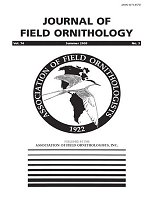Tartar emetic is frequently used to force regurgitation in birds, allowing the study of diet while minimizing mortality. However, the responsiveness to the emetic in terms of regurgitation and mortality rates has been shown to be highly species-specific. A total of 369 individuals (44 species) present in an area of Brazilian Atlantic Forest received the tartar emetic during 410 treatment events. These birds were mainly insectivores, frugivores, and omnivores. Regurgitation occurred in 70% of the treatments, with an overall pre-release mortality of 10%. Average latency time was 20 min, and it was not correlated with average species body mass. Incidence of regurgitation was lower and mortality was higher in the first hours of the day. Incidence of regurgitation varied with feeding guild, taxonomic family, and body mass classes in univariate tests, but only with guild after the effects of family and body mass had been controlled for. Incidence of mortality was affected by family. Responsiveness did not vary between males and females. Mortality occurred more frequently among individuals that failed to regurgitate than among individuals that did regurgitate (85% vs. 15% of mortality events). Recapture rates were lower among treated individuals than among untreated individuals (10 vs. 13%), and lower among treated individuals that failed to regurgitate than among those that did regurgitate (8 vs. 11%), but these differences were not statistically significant. Treated and untreated birds presented statistically similar displacement rates between transects (32 vs. 42%). Our recommendation is that the tartar emetic should be used with caution, and alternative methods should be favored for those species presenting unsatisfactory responses to the tartar emetic. We also recommend that the use of this substance should be avoided in the first hours of the day, when the birds had little time to forage.
How to translate text using browser tools
1 July 2003
An evaluation of the use of tartar emetic in the study of bird diets in the Atlantic Forest of southeastern Brazil
Renata Durães,
Miguel Ângelo Marini
ACCESS THE FULL ARTICLE
It is not available for individual sale.
This article is only available to subscribers.
It is not available for individual sale.
It is not available for individual sale.

Journal of Field Ornithology
Vol. 74 • No. 3
July 2003
Vol. 74 • No. 3
July 2003
Atlantic forest
Bird
Brazil
diet
regurgitation
tartar emetic




